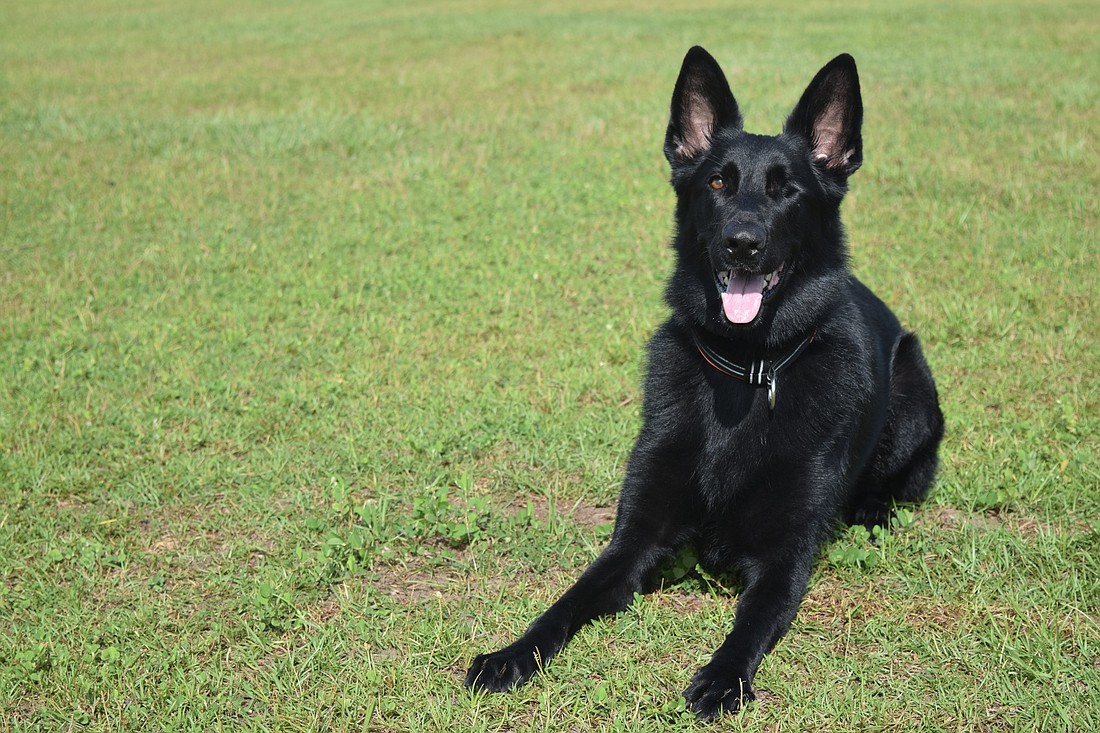- April 24, 2024
-
-
Loading

Loading

DR. PHILLIPS Dr. Phillips resident Matt FitzGibbon’s dog Vesper is an active, high-drive German Shepherd who serves as a human-remains-detection dog and loves chasing tennis balls.
She’s also missing one eye.
THE START OF A JOURNEY
It all started three years ago, when FitzGibbon’s wife read a book about canine search and rescue. She thought it would be something he would be interested in, so she gave the book to him. After reading it, he did some research online and found the Florida Alliance of Search and Rescue K-9 in DeLand.
“I called up the leader and she said, ‘Come to training; see what we do,’” FitzGibbon said. “So I went out on a Saturday morning and was absolutely amazed watching these dogs work in the woods. That led me to the training for myself, training for the dog and all of that.”
He got Vesper when she was 10 weeks old, and they immediately began her HRD training. But he quickly realized there was a problem after she suffered constant eye infections, conjunctivitis and other complications. He had to suspend Vesper’s training for a while as they went through the confusing process of trial and error, trying to diagnose and treat the issue.
Eventually, they were referred to the small-animal hospital at the University of Florida in Gainesville, where veterinarians diagnosed Vesper with a neurogenic eye disease that caused the tear-production gland in her left eye to shut down completely.
For a one-and-one-half years, the family tried eye drops, medications and surgeries. At one point, FitzGibbon had to give Vesper 23 eye drops per day in each eye and six pills. But because Vesper was such a high-drive puppy, it was difficult to wrestle with her and get her to sit still for the medication. So he turned to Central Florida K-9, a dog-training facility in Orlando.
“As a high-drive puppy, it’s kind of like living with a Tasmanian devil,” he said. “Central Florida K-9’s trainers helped me understand how you give 46 eye drops and six pills a day to a dog and not have her hate your guts. They were instrumental with helping me work through her issues on the training side and they have a lot of great advice.”
Eventually, it became evident that Vesper’s eye disease was too severe to be controlled by medication. After a long, extended hospital stay in Gainesville, the only option left was to completely remove her left eye.
Following the removal of Vesper’s eye, she went through a difficult recovery period when she had to wear a “cone of shame” for a few months.
“After several months in recovery we went back out to training and it was like a duck to water,” FitzGibbon said. “She was just right back at it. Her favorite thing to do is search.”
HAPPY TO SEARCH
Since then, Vesper and FitzGibbon have continued to train and serve with FASAR K-9 and Central Florida K-9.
FASAR’s search-and-rescue team is a nonprofit organization, and all handlers and dogs are volunteers who train together each week all over Central Florida at environments ranging from state parks to fire-rescue facilities.
“We own our own dogs, we train together as a team and train the dogs together as a team, because training a good search-and-rescue dog takes a team of people,” he said. “You can’t do it individually. I tell people that it takes a small city to train a rookie handler and certified disabled dog — that took a whole city.”
As a certified National Association for Search and Rescue HRD Land Type IV Wilderness dog, Vesper’s training is all on-the-job when she is out searching. FitzGibbon and other handlers put targets and source material out in the woods, and they have different drills and behavioral shaping devices for the dogs.
He said that Vesper, now 3 years old, is a very sweet, high-drive dog who loves people and loves to work. She is a bit more insecure than most dogs because of her limited field of vision but has learned to adjust to targeting.
“Workability-wise, she works just like any other dog on the team,” he said. “I usually deploy her only in areas I’m familiar with or that I’ve walked or seen — I don’t just cut her loose. I have to manage her search area, but if we’re in yards or field or wilderness, I’m not worried about debris.”
The FASAR team works in conjunction with law enforcement and can be called out any time to assist them in searches. Sometimes the team goes six months or more without a call, but earlier this year, FitzGibbon was out four times in one month.
“Sometimes, we’re out for a day; sometimes we’re out for two to four days,” he said. “We have certified dogs who are trackers and trailers and scent dogs. We also then have our certified cadaver dogs, so we can respond to whatever situation they have.”
Handlers train the dogs to recognize a certain odor, and if the dogs find it and alert, they get rewarded with a toy or treat.
“It has been a difficult journey, but there has been a whole city of people who have contributed to her success and they all deserve the credit,” he said of Vesper’s journey.
Contact Danielle Hendrix at [email protected].